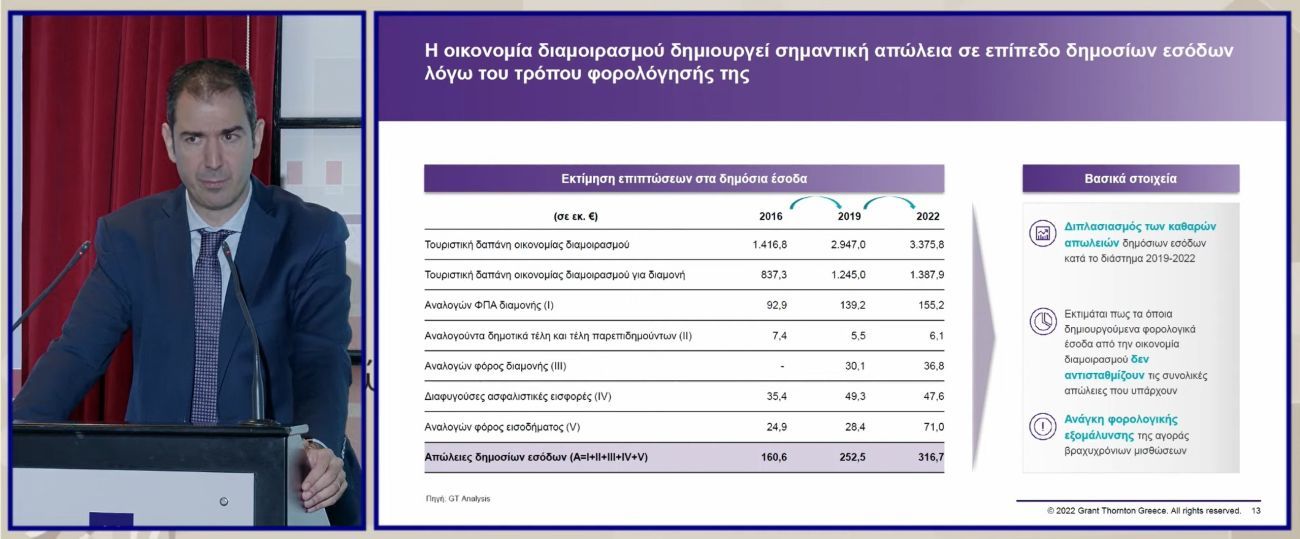Greece’s Short-term Rental Market Booming But Costing State Millions of Euros, Says Study
The short-term vacation rental market size in Greece is evolving fast, reaching 3.3 billion euros this year, but at the same time is causing the state to lose millions in tax revenue, according to a study conducted by consulting firm Grant Thornton.
Presented on Monday during a conference held by the Hellenic Chamber of Hotels, the study “Short-term Rentals: Consequences on Cities and Citizens” revealed that currently there are approximately 129,000 short-term rental properties operating in Greece, and listed on websites such as Airbnb, when in 2016 the number was only a little over 57,000.
“We are talking about a number that is particularly high and now represents a very important part of the tourism market,” Grant Thornton’s Panagiotis Prontzas said.
According to the study, the short-term rental market in Greece grew to 3.3 billion euros in 2022 from 2.96 billion euros in 2019 and 1.42 billion euros in 2016. It now accounts for 15 percent of the total tourism market, with the Hellenic Chamber of Hotels arguing that a market of that size can no longer be left without a proper regulatory framework.
Greek hoteliers for some time have been arguing that hotels are facing unfair competition from Airbnb-style rentals in Greece due to “loopholes” in the current short-term rental legislation, which also translates to a great loss for the government in taxes and insurance contributions due to undeclared work.
Moreover, the loopholes in the legislation have “allowed” investors to even buy entire buildings to rent out apartments for the short-term while actually functioning as hotels.
Short-term rentals costing Greece millions, the study says

Grant Thornton’s Panagiotis Prontzas presenting data on the estimated loss in public revenue in Greece due to the lack of proper regulatory framework for short-term rentals.
Grant Thornton’s study presented data estimating that due to lack of proper regulatory framework and tax obligations, short-term rentals in Greece are causing the state to lose millions of euros.
In 2016, the estimated net losses of public revenue reached 160.6 million euros and in 2022 the amount almost doubled to 316.7 million euros.
“If we compare the legislation for short-term rentals with those that exist for hotels and restaurants, we will see a huge gap,” Prontzas said.
Hotel chamber: Enough is enough
“Ten years after the chamber first touched the issue, the phenomenon has grown into a gray zone, one without rules, checks or certifications but with undeclared work and shadow economy practices,” the chamber’s president, Alexandros Vassilikos, said, highlighting serious social effects that have emerged from the “uncontrolled” short-term rental landscape.
Among other things, the Grant Thornton study showed that short-term rentals deprive the creation of additional (declared) 39,000 jobs on an annual basis while all the more property owners prefer to abandon the long-term rental market and switch to renting their properties for the short-term in order for a bigger profit.
Housing shortage
“The average price of short-term rentals is five times higher than that of long-term leasings, creating strong incentives for owners to place their properties on the short-term market,” the study notes.
Vassilikos stressed the impact of the short-term rental market on society.
“The results of this activity is right in front of us: soaring rents for families, doctors leaving the islands because they can’t find accommodation, professors and teachers sleeping in cars. All this while destinations are losing their charm and character, while permanent residents feel insecure every day, since there is no control,” Vassilikos said, stressing that Greece has lagged in dealing with the phenomenon compared to the rest of Europe and the social costs are becoming really unbearable for citizens.
“This situation can no longer continue… The immediate intervention of the State for a fair regulation of short-term rentals is imperative.”
Proposals
On that note, Vassilikos presented a set of proposals to regulate short-term activity, including:
– setting a limit to how long a property can be rented annually: the chamber is calling for accommodations to be allowed to be rented for the short-term up to a maximum of 90 nights per year in the whole country.
– restrictions depending on the destination: the chamber is calling for legislation to prohibit hosts from renting a property for the short-term for more than 60 days per year if it is located on an island with less than 10,000 residents or in a destination with a low average occupancy of hotels. Also, the chamber says that permits for new short-term rental properties should be denied in areas where such accommodation already exceeds 50 percent of residences that are leased for the long-term.
– a limit on the number of short-term rental properties per owner: the chamber is calling for a “cap” of two short-term rental permits per owner who is not a professional.
– fair taxation: the chamber is calling for short-term rental owners to pay municipal fees and stayover tax.
Mayor: There is uneven distribution, A plan for each neighborhood is needed
Following the presentation of the study, Athens Mayor Kostas Bakoyannis said that while Airbnb-style rentals can be a “blessing” for some home owners, it can also be a “curse” for others.
“A short-term rental may strengthen someone’s income, but it leads to increases in rents, and creates issues in social cohesion in cities and especially in apartment buildings which are the core of urban life”, he said, highlighting the need for a regulatory framework that would put each local government in charge of approving permits for short-term rentals.
According to the mayor, what is needed is a plan that would meet the “profile” of each neighborhood individually.
“There are neighborhoods that have reached their limits with short-term rentals and others that are in immediate need… Let’s not forget that tourists are looking for an authentic experience and for this Athens should maintain its image,” he concluded.
Citing data from watchdog website Inside Airbnb, analytics platform Airdna and lodging reservations website Booking.com, the areas in central Athens with high demand for short-term rentals include Zappeio, Koukaki, Kerameikos, Larisis station and Petralona.
Minister: Rules are on their way
On his part, Greek Tourism Minister Vassilis Kikilias said the government is working towards legislation that will define different rules for “professional managers” that rent out many properties and householders that are renting their home for the short-term simply for extra income and have not made a business out of the activity.
“Short-term rentals are part of our tourism product… The government is planning a framework that will separate those who rent out properties in bulk (investors) and the majority, which are owners who rent out just one or two properties,” he said.
Moreover, Kikilias said that the government is planning to put a cap on the number of properties that can be made available for short-term rental in urban centers, in order to solve the problem that sees doctors, professors and university students unable to find housing due to the lack of properties available for long-term leasing.
It is reminded that earlier this month the European Commission presented a set of proposed rules to regulate short-term accommodation rentals in member states and help authorities ensure balanced tourism development.












The more restrictions the Authorities apply the more loopholes will be created and the cost of Administration will be very high. Needless to say, all short-term properties in the market must be licensed, inspected and must contribute to the fiscus in the normal course of business.
Sounds unfair to the short term renters who do pay their taxes.